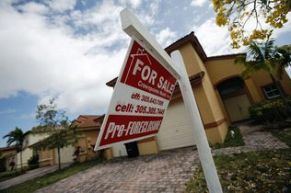‘Shadow inventory’ of homes could topple real-estate recovery
Article Courtesy of The Miami Herald
By TOLUSE OLORUNNIPA
Published October 20, 2011
Officially, there are 3.5 million homes for sale nationwide. But there are millions more lurking in the shadows — hidden neatly away on banks’ balance sheets, stalled in foreclosure court proceedings, or simply occupied by nonpaying owners as lenders wait months or years before taking action.
The housing market’s ballooning shadow inventory — buoyed by a yearlong foreclosure slowdown — stands as its most menacing problem, threatening to stifle recovery for several years.
And South Florida, with some 200,000 homes either already owned by lenders or headed for foreclosure, has one of the nation’s largest collections of unseen inventory. The number of shadow homes dwarfs the 30,000 or so that are listed on the active market. Even as prices have shown signs of stability this year, an impending wave of foreclosures threatens to keep real estate values deflated in South Florida and across the country.
“A lot of people don’t understand how much inventory is set to come online in the next 18 to 24 months,” said Jack McCabe, CEO of McCabe Research & Consulting in Deerfield Beach. “When you compare what the Realtors show is inventory to what’s out there, you realize we have a long way to go.”
A Miami Herald analysis of four years of foreclosure data and thousands of property records found record -high levels of shadow inventory in several housing markets across the nation.
Though these shadow properties are routinely left out of monthly reports by real estate trade groups, their influence on home values has grown sharply in recent years.
In the supply-and-demand reliant real estate market, the national supply of homes is officially listed at about 3.5 million, or nine months’ worth of homes (home sales are on track to reach about five million this year). But once shadow inventory is added, that supply more than doubles, to at least 7.5 million. A healthy housing market has about six months’ supply of properties, which would be about 2.4 million.
The wave of homes set to hit the market in the coming years consists of discounted distressed properties, which tend to drag down neighborhood values. |
|
 A for sale sign hangs in front of a Homestead, Fla. home |
The Analysis To estimate the size of shadow inventory, The Miami Herald determined the number of bank-owned homes by calculating the difference between the number of homes lenders have repossessed since 2007 and the number of homes they have sold to new owners over the same period of time. The Herald also calculated the number of homes in the foreclosure pipeline—properties that have begun the process or are so far behind on payments that future foreclosure is virtually inevitable. The analysis did not include homes that are currently listed for sale. Data from real estate research firm RealtyTrac, the U.S. Census Bureau, data firm Lender Processing Services and real estate trade group were used in the analysis. |
|
Economists insist that the housing industry will not normalize and recover until most of the foreclosures work their way through the system — a process that will likely last several more years.
Shadow inventory can be broken into three categories:
• Properties lenders have repossessed, but have not put up for sale. These homes are referred to as real-estate owned, or REOs.
• Properties caught up in the clogged foreclosure process.
• Properties that are severely delinquent in loan payments — almost certainly headed for foreclosure — but have not yet entered the process.
Calculating the size of the shadow market has proven difficult, and estimates range from 1.6 million to seven million homes. The Herald analysis, using data from several mortgage research firms, real estate trade group figures and public records, found the following shadow inventory in South Florida:
• 40,000 houses already owned by lenders but not yet for sale.
• 124,000 units whose owners have received an initial foreclosure notice, or notice of default, but have not yet been foreclosed upon.
• 37,000 properties whose owners are 90 days or more behind on their payments but have not yet been served with a foreclosure notice.
For hard-hit housing markets like South Florida, Sacramento, Las Vegas and Cleveland, The Herald culled thousands of property records for lender-owned homes, and checked whether those homes were being listed on the open market. In a large number of cases, they were not.
TALE OF ONE HOME
Bank of America has owned the small two-bedroom at 1711 NW 80th Street in Miami-Dade County since August 2008, when it repossessed the home from the estate of Lucile Moore (who died in 2007 after nearly 30 years in the house). Three years later, the property is not listed for sale on the open market, and is part of the bank’s growing collection of unlisted properties. Bank of America did not respond to a request to comment about this property.
In the aftermath of the largest home repossession campaign in history, mortgage lenders are holding properties off the market as a matter of strategy. Flooding the fragile housing market with an additional 500,000 to 1.1 million homes — many of them deteriorating and selling at deep discounts — would cause already weak prices to fall further.
Mortgage lenders have shown no indication they are planning to ramp up foreclosure sales, and a growing number of vacant homes have idled on banks’ balance sheets for several years.
According to data firm CoreLogic, which has one of the more conservative estimates of shadow inventory, the current mortgage debt outstanding in the shadow inventory is about $336 billion. Liquidating REO homes through the sales process usually leads to significant write-downs on bank balance sheets. Wary of seeing such large losses appear in earnest on their books, lenders have been reluctant to deal with bad loans head-on, said Ira Rheingold, executive director of the National Association of Consumer Advocates.
“They’re afraid,” he said. “They don’t want to take those paper losses. Their books show that they have these assets that are worth x amount of money. But those values are not real.”
In Maricopa County, Ariz., public records show that Bank of America owns about 1,300 properties, clustered in cities like Phoenix and Mesa. Most of those homes are not being marketed for sale on the lender’s designated website for bank-owned properties, where only 440 Phoenix-area homes are for sale. In many parts of the country, the federal government is the largest institutional property owner, as government-run Fannie Mae, Freddie Mac and the Federal Housing Administration hold about 250,000 homes.
While at least 100,000 of those are not yet on the market, a review of public records in several states showed that Fannie and Freddie were more likely than other lenders to quickly liquidate foreclosed homes.
“We don’t have a shadow inventory because our inventory consists of homes that are on the market and homes that we’re bringing to market,” said Fannie Mae spokesperson Andrew Wilson. “Our goal is to sell as quickly as possible.”
The outlook for shadow inventory has worsened considerably over the last year because of lender paperwork problems that have gummed up the foreclosure system.
A year ago, major mortgage servicers discovered that employees were systematically cutting corners in the foreclosure process, often signing thousands of false or incomplete legal documents each day.
Chae duPont, a Miami foreclosure defense attorney, said a growing number of her clients are opting to voluntarily default on underwater mortgages if they are unable to get a satisfactory loan modification.
“They’re making a decision to continue living in the property for 18 to 36 months and then they negotiate a short sale,” she said. “It’s not an easy decision, but sometimes it’s the only thing that makes financial sense.”
Beverly Birge of Cooper City said many financial advisors told her to strategically default on her three-bedroom home in 2009 as her mortgage payments started going up right before she was to retire from her job as a teacher. Instead, she spent two years trying to do a mortgage modification, a process she said was hampered by lost documents and misinformation. The bank later agreed to accept a short sale, and Birge, 70, has been trying to sell the home since August.
“We haven’t paid [the mortgage] since about April or May,” she said. “Instead, we’ve taken that money and put it in a savings account, so that we will be able to rent when this is all over.”
ALTERNATIVES
Nationwide, 2.5 million homeowners are 30 to 60 days behind on payments, a sign that the stagnant economy and tepid housing market continue to push more people into the foreclosure pipeline.
Given the grim outlook, lenders have begun to consider new alternatives to foreclosure. Short sales have increased this year, and real estate agents say the once-onerous process of selling a home for less than what’s owed on it has become more streamlined.
Banks are also cutting deals with homeowners who agree to hand over the keys to a house, rather than go through a legal battle. In some cases, lenders are forking over wads of cash to convince troubled borrowers to leave their homes amicably.
“We have been making enhanced financial relocation offers — primarily in states where the foreclosure timelines are extended,” said Jason D. Menke, spokesman for Wells Fargo. “We’ve been offering as much as $10,000 or $20,000 to borrowers who are willing to do a deed-in-lieu or a short sale.”
Birge said she is expecting to receive a $3,000 check when her short sale is completed.
A group of attorneys general has spent the past year trying to negotiate a settlement with major U.S. banks accused of wrongfully foreclosing on homeowners.
The process has been slow, as the banks have rejected calls for widespread principal reductions and public officials have called for steep penalties. California Attorney General Kamala Harris pulled out of the negotiations last month, saying the proposed agreement was “inadequate.”
McCabe, the Deerfield Beach consultant, said it’s in lenders’ best interest to keep hundreds of thousands of struggling borrowers from entering the foreclosure pipeline, even if it means writing down principal balances for underwater homeowners.
“Unless they agree to do principal reductions coupled with mortgage modifications, these delinquent properties will eventually have to be sold,” he said. “Which means more banks will fold, because they can’t stomach those losses.”






